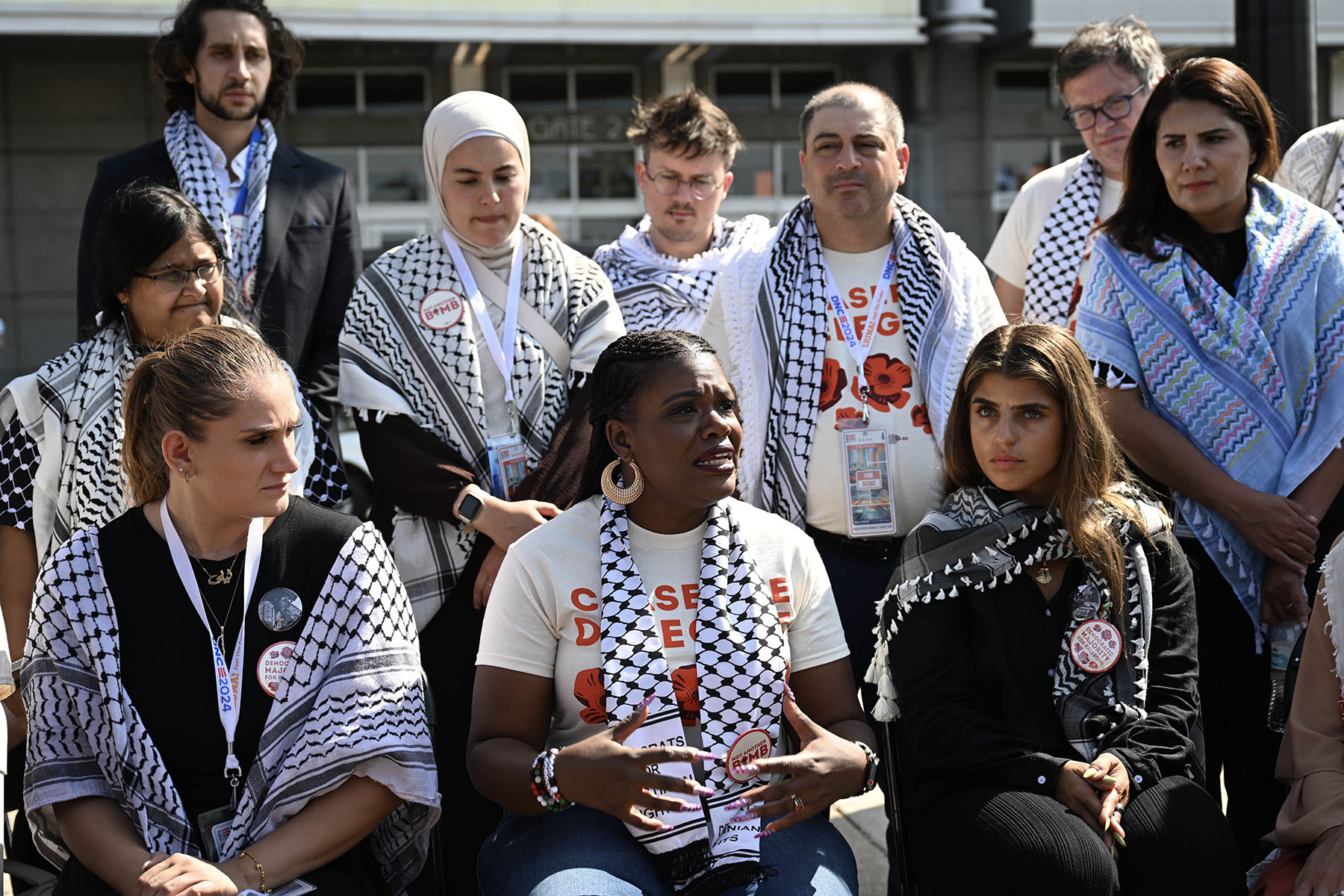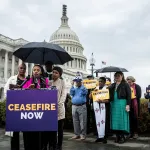Your trusted source for contextualizing Election 2024 news. Sign up for our daily newsletter.
Heading into the final night of the Democratic National Convention, questions loomed over if — and how — Vice President Kamala Harris might address the Israel-Hamas war in her historic speech accepting the party’s nomination.
The buildup to Gaza and Israel in her remarks was clear as she switched to discussing American foreign policy and military strength. Then, she addressed the war head-on.
“The scale of suffering is heartbreaking,” Harris said from the DNC stage. “President Biden and I are working to end this war such that Israel is secure, the hostages are released, the suffering in Gaza ends and the Palestinian people can realize their right to dignity, security, freedom and self-determination.”
Devoting time in her speech to discuss the war showed Harris understood the importance of this issue to Democratic voters. A group in the arena wearing “Democrats for Palestine” scarves with a keffiyeh pattern made faint “free Palestine” calls that gave way to enthusiastic applause as Harris continued.
But other pro-Palestinian advocates had mixed reactions to the speech. For those pushing for a presence onstage in tandem with private policy talks, her words were disappointing.
“It was still not enough,” said Darakshan Raja, who was at the DNC attending the Asian American and Pacific Islander Caucus meeting. “The framework is very much about, ‘We are going to continue to protect Israel’s right to self defense,’” which Raja equates to supporting a Palestinian genocide. Officials have said more than 40,000 Palestinians have been killed in Gaza since October.
References to the Israel-Hamas war, particularly the humanitarian crisis in Gaza, were muted throughout official DNC programming. Some of the strongest language came in an emotional speech from Jon Polin and Rachel Goldberg-Polin, parents of a 23-year-old American held hostage since his kidnapping on Oct. 7, who urged for a ceasefire and return of all hostages.
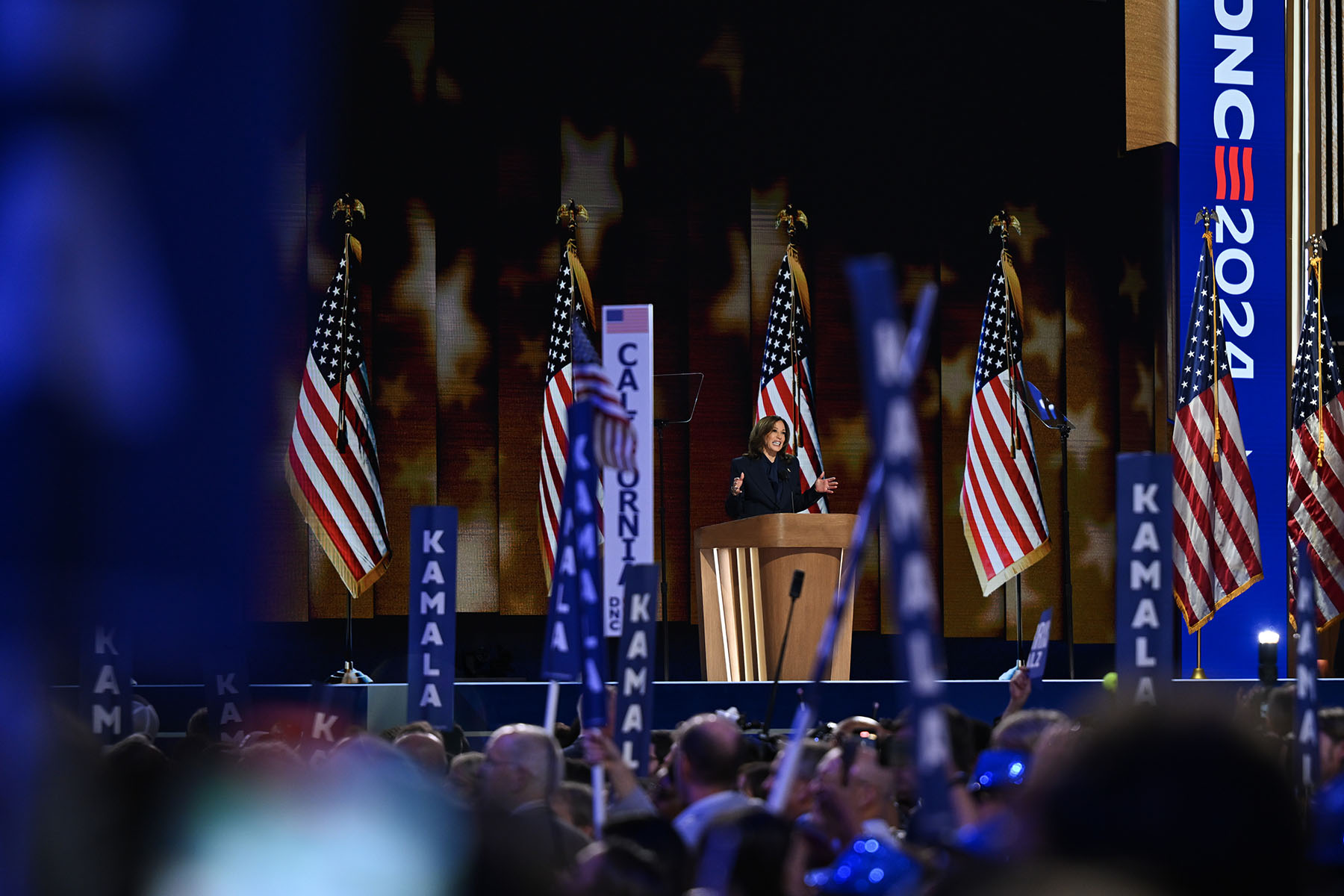
Harris also called for a ceasefire, as she has done in the past. Her words on Thursday were familiar, but the stage on which she chose to state them was significant. She stated that Israel has a right to defend itself after the Oct. 7 Hamas attack that claimed over 1,200 Israeli lives. She also noted the ongoing deaths and suffering of thousands of Palestinian people in Gaza, and called for a ceasefire.
Harris’ acceptance speech “was an opportunity to show people outside of that room that she is strong, that she is clear, that she understands the problems currently as they exist in the U.S., and is able to play on the international stage,” said Debbie Walsh, director at the Center for Women and Politics at Rutgers University.
Research has shown people assume women candidates are strong around domestic policy, Walsh said, so Harris needed to convey authority around foreign policy issues. She noted Harris was more “hawkish” and projected strength.
“As commander-in-chief, I will ensure America always has the strongest, most lethal fighting force in the world,” Harris said Thursday night.
After the speech, many credited Harris with threading a needle on one of the country’s most divisive issues as she seeks to distinguish herself from Biden as a leader, maintain support among pro-Israel Democrats and also speak to the concerns of those advocating for an end to the killings of Palestinian people in Gaza. Polling indicates that a majority of people in the United States disapprove of Israel’s military actions in Gaza.
The acceptance speech is not traditionally a time when a nominee would discuss policy in detail. But much of the lingering frustration among pro-Palestinian critics stems from the lack of Palestinian representation on an otherwise intentionally diverse stage.
“The theme was joy, the theme was freedom. And yet, it’s very clear that Palestinians, Muslims, Arabs, actually don’t fall into that particular category, that there was a very clear exclusion happening,” Raja said.
Raja is the executive director of Muslims for Just Futures, one of over 200 groups who hosted the Monday’s pro-Palestinian event, “March on the DNC 2024,” that reportedly drew over 12,000 protesters. She spoke with The 19th in her personal capacity.
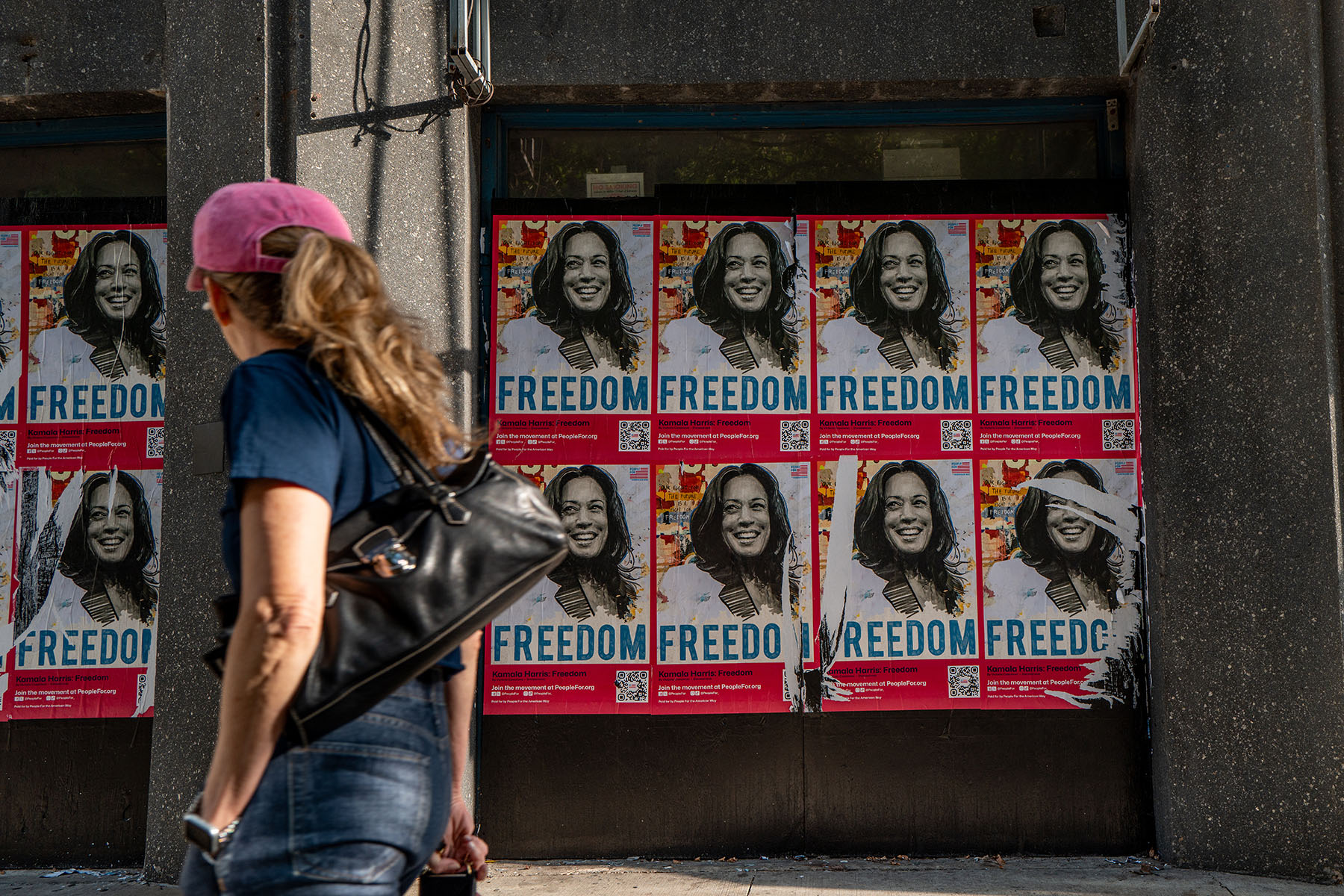
The Uncommitted Movement, a group including delegates who have not lined up behind any presidential candidate, had also been making plans for Chicago for weeks. The group’s leaders said they had been negotiating with the DNC over three specific asks: a meeting place for uncommitted delegates, a public forum and a time in official programming for a speaker to talk about the Palestinian experience. The first two were met, with a panel on Palestinian human rights convening on Monday.
On Wednesday, the Uncommitted Movement heard that they would not be getting a speaker slot. The organization had floated several potential names, including first-term Georgia state Rep. Ruwa Romman, who is Palestinian-American. Romman was not originally credentialed for the DNC and spent Wednesday writing a short speech that ultimately never made it to the crowds in the United Center.
“I’ve had some pretty crushing days, but to be honest today took the cake,” Romman posted on X. “I do not understand how there’s room for an anti-choice Republican but not me in our party.” She was referring to former Georgia Lt. Gov. Geoff Duncan, who is endorsed by the anti-abortion Georgia Life Alliance and spoke at the Democratic convention on Wednesday.
News of the denied request for a Palestinian American speaker quickly gained attention on social media. Muslim Women for Harris Walz released an Instagram statement on Thursday that received tens of thousands of likes and reshares on different social media platforms saying the group would disband in light of the decision. Some public officials, like Minnesota Attorney General Keith Ellison, also spoke out on the potential power of a Palestinian American voice.
It’s unclear whether pressures on Harris in the days leading up to and during the convention shaped her language on the issue in her acceptance speech. The spectrum of reactions from organizers highlights the delicate line Harris will continue to walk in the two and a half months until Election Day — and throughout her presidency if she is elected.
The reaction to the Uncommitted Movement’s presence at the DNC was varied; some people accused the group of being anti-abortion or pushing for a Trump presidency. That’s not true, said Natalia Latif, communications director for the Uncommitted Movement. “We’ve been warning Democrats about the fact that their policies are deeply unpopular with their base, and if they don’t change course, Donald Trump will become president in January.”
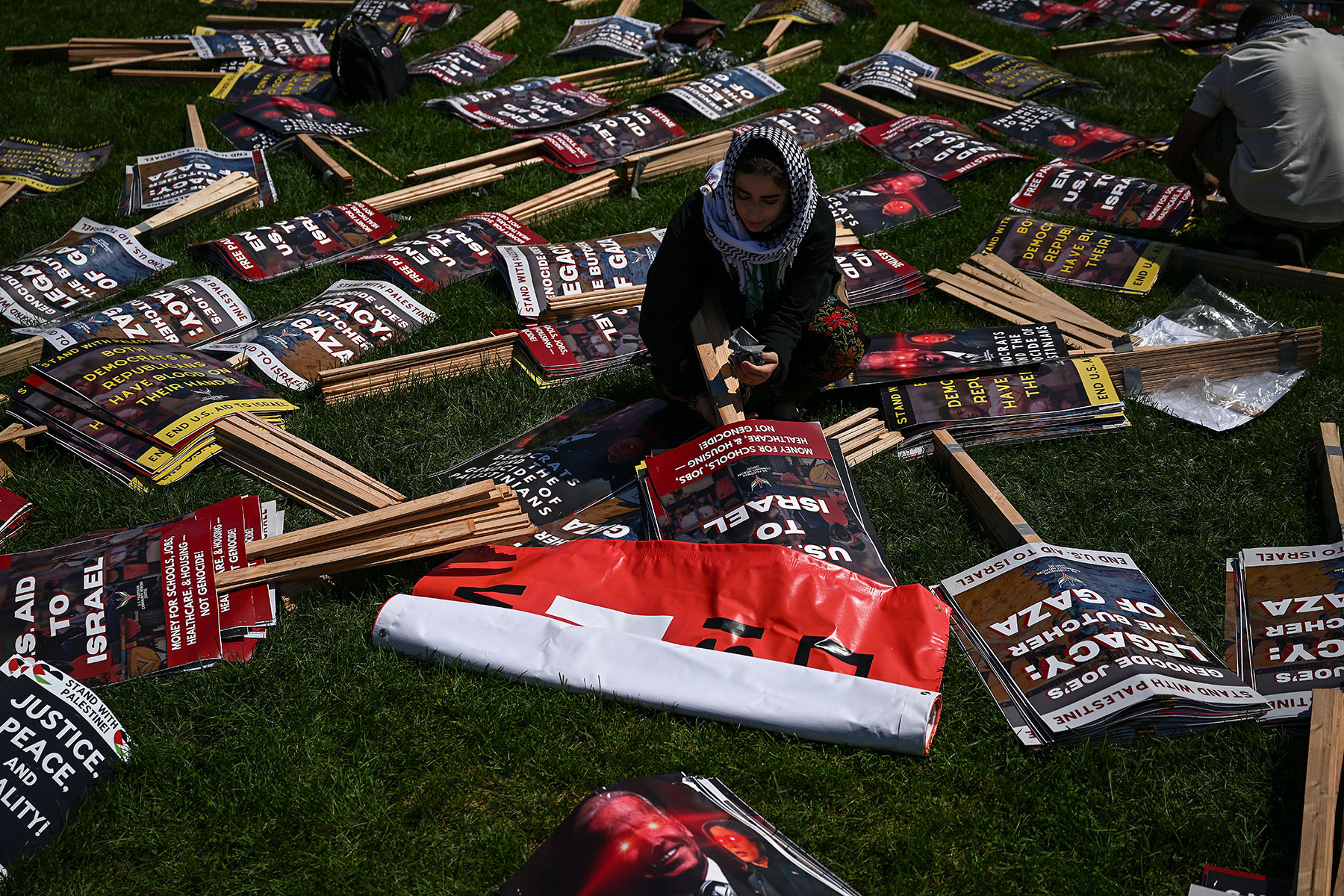
“This movement is a gift for Democrats to wake up and change their policy” Latif said — before it’s too late.
The Uncommitted Movement is taking time to regroup on next steps as they continue to push for their core policy demands of “getting an arms embargo, stopping this war and saving lives,” Latif said on Friday morning. On the whole, she said the group has felt better reception from Harris’ team than Biden’s, who never responded or engaged with them — the difference is “night and day,” Latif said. That’s why some people were surprised that Biden gave a casual shout-out to the protestors on Monday night, saying “they have a point.” Latif sees that as a direct result of the work activists have been doing.
“I think that it took 10 months for the president to realize that the people outside protesting his policies in the street are human beings, they are Americans, they are voters, and his continued denial of their valid concerns has deeply fractured the party,” she said.
“I’m glad to see that he’s starting to change his language. But we need action. We need policy change now.”
Amanda Becker contributed reporting.
To check your voter registration status or to get more information about registering to vote, text 19thnews to 26797.
